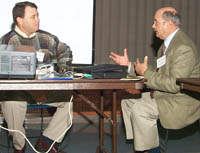Cooperative Extension And Ag Lenders Address Farm Crisis
Cooperative Extension And Ag Lenders Address Farm Crisis

In a Bluegrass regional meeting at the Fayette County Extension Office January 21, Cooperative Extension agents met with agricultural lenders to discuss ways to handle the current farm crisis. The Bluegrass region represents nine counties in Central Kentucky.
University of Kentucky Agricultural Economists, Steve Isaacs, Greg Ibendahl, and Will Snell addressed a crowd of lenders and county agents. They explained the current financial problems farmers are facing. They agree that Kentucky is facing adversity, but they know it could be worse.
"Is there a financial crisis?" Isaacs asked. "We can tell there is a crisis by the three strikes we have -- low commodity prices, regional droughts, and tobacco quota cuts. Is it like it was in the 80s? No, now we have lower interest rates and low inflation, equity and land values are holding well, the general economy is expanding, and ag credit is in a better position."
Isaacs emphasized surviving the current crisis could involve many strategies, including cost cutting, stress management, asset liquidation, government programs, changing the enterprise mix, and on- and off-farm alternatives. He also discussed the need to be prepared for the next crisis by creating risk management plans, setting aside resources for reserves, reviewing loan terms, and learning the difference between tax management and tax avoidance.
Joe Hafley, a loan review officer for the First Southern Bank in Lincoln County, is heavily involved in the agricultural credit system. He likes working with farmers and said that communication and timing are things he uses to get through crisis times.
Hafley said there are five C's to ag credit. Ag lenders need to guard against Complacency, to avoid being Careless and get it right the first time. Also, he said he can't overemphasize Communication; if a borrower is having a problem, he needs to know he can talk to his lender. Contingencies are an issue; farmers expect to depend on experts in the ag lending business. Finally, Competition sometimes drives the issues. "I think working in meetings like this and working with farmers and with (Cooperative) Extension is a good way for ag lenders to know how to deal with agriculture," Hafley said.
